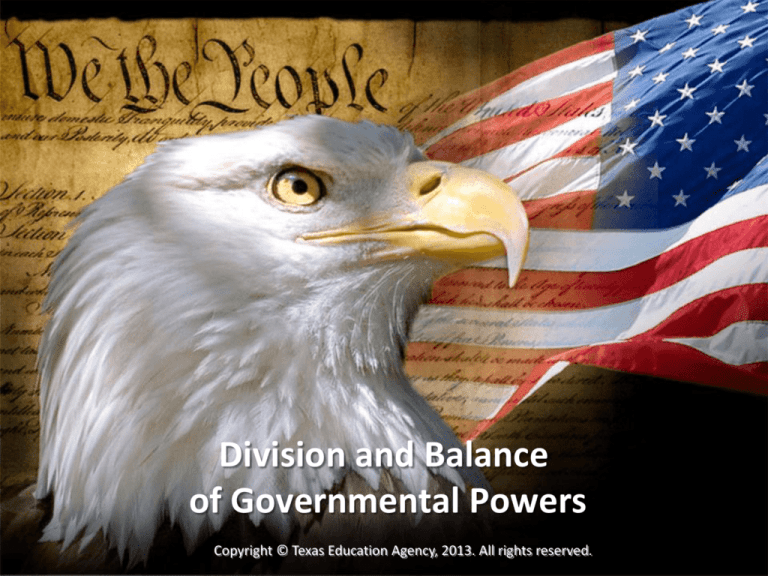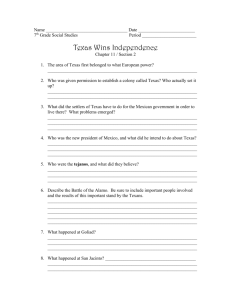
Division and Balance
of Governmental Powers
Copyright © Texas Education Agency, 2013. All rights reserved.
Copyright and Terms of Service
Copyright © Texas Education Agency. The materials found on this website are copyrighted © and trademarked ™ as
the property of the Texas Education Agency and may not be reproduced without the express written permission of the
Texas Education Agency, except under the following conditions:
1)Texas public school districts, charter schools, and Education Service Centers may reproduce and use copies of the
Materials and Related Materials for the districts’ and schools’ educational use without obtaining permission from the
Texas Education Agency;
2) Residents of the state of Texas may reproduce and use copies of the Materials and Related Materials for individual
personal use only without obtaining written permission of the Texas Education Agency;
3) Any portion reproduced must be reproduced in its entirety and remain unedited, unaltered and unchanged in any
way;
4) No monetary charge can be made for the reproduced materials or any document containing them; however, a
reasonable charge to cover only the cost of reproduction and distribution may be charged.
Private entities or persons located in Texas that are not Texas public school districts or Texas charter schools or any
entity, whether public or private, educational or non-educational, located outside the state of Texas MUST obtain
written approval from the Texas Education Agency and will be required to enter into a license agreement that may
involve the payment of a licensing fee or a royalty fee.
Copyright © Texas Education Agency, 2013. All rights reserved.
2
System of Checks and Balances
Legislative Branch
– National legislature: two bodies of
government
– Senate - two members from every state
– House of Representatives - seats
allocated to the states in proportion
to their population
– All taxing and appropriating funds
must originate in the House
Copyright © Texas Education Agency, 2013. All rights reserved.
3
System of Checks and Balances
– House - has the power to impeach or accuse any civil
officer of the U.S. (President and Vice President) of
treason, bribery, or other high crimes and
misdemeanors
– Senate has the sole power to try all impeachment
cases
– Major legislation requires a two-thirds vote for
passage
– Amendments to the Articles require a unanimous
vote of the states
Copyright © Texas Education Agency, 2013. All rights reserved.
4
System of Checks and Balances
Executive Branch
President
and Vice
President
elected by
the people
Political party private
organization of
citizens who
select/promote
candidates for
election to
public office
Electoral
votes
determine
who wins the
Presidency
Copyright © Texas Education Agency, 2013. All rights reserved.
5
System of Checks and Balances
• Judicial Branch
– Headed by the Supreme Court
– Decides on the constitutionality
of a statute passed by the
legislative branch and signed by
the President as head of the
executive branch
Copyright © Texas Education Agency, 2013. All rights reserved.
6
Changing the Constitution
Amendment
• To change or
alter
Two-thirds
majority vote
in both the
Senate and
the House
Legislatures of
two-thirds of
all the states
to call a
convention of
all the states
Must be
ratified by the
legislatures of
three-fourths
of the states
or
conventions in
three-fourths
of the states
Copyright © Texas Education Agency, 2013. All rights reserved.
7
U.S. Form of Government
• Representative Democracy
(republic)
– Voters select representatives to
make the day-to-day decisions
– Sovereign power ultimately
resides in the people
Copyright © Texas Education Agency, 2013. All rights reserved.
8
The Power to Govern
• Rights were written by representatives
of the people elected by voters in the
13 original states
First Official United States Flag
June 14, 1777
Lasted for a period of 18 years
Copyright © Texas Education Agency, 2011. All rights reserved.
9
The Power to Govern
• Sovereignty of the States
– Tenth Amendment- acknowledges the continued
sovereignty of all of the states to govern their own
citizens within their own borders
– Supreme political authority free from external
control
– Article VI- recognizes the Constitution to be the
supreme law of the land
– Constitution prevails over any possible contrary
state constitutions or law
Copyright © Texas Education Agency, 2013. All rights reserved.
10
The Power to Govern
• Limiting States’ Powers
– U.S. citizens cannot receive special
privileges from individual states
– All persons born or naturalized in the
U.S. are subject to the jurisdiction of
the U.S. and the state wherein they
reside
Copyright © Texas Education Agency, 2013. All rights reserved.
11
The Power to Govern
Duty to protect
every state against
invasion
May establish post
offices, coin
money, and tax
imports/exports
Regulate interstate
commerce
Regulate foreign
commerce
States regulate
intrastate
commerce
Copyright © Texas Education Agency, 2013. All rights reserved.
12
Assignments
Independent Practice Assignments
1. How Government Affects a Day in My Life Poster: Ask students to record
the events of a day in their lives and note the agencies that have some
connection to these events. Give examples to help students get started
with this assignment. For example, the hamburger they ate for lunch was
tested by the FDA and the hair dryer they used in the morning was
regulated by the Consumer Product Safety Commission. The assignment
(poster) should have at least ten events and government relationships.
The poster should include words and pictures.
2. Division of Governmental Power Poster: Split the class into teams with
two members. Each team must design a poster that defines the Executive,
Legislative, and Judicial branches of government through words and
pictures. The poster should indicate what individuals (specific names) are
involved in each branch of government. The legislative branch can include
names of representatives from your state.
Copyright © Texas Education Agency, 2013. All rights reserved.
13








